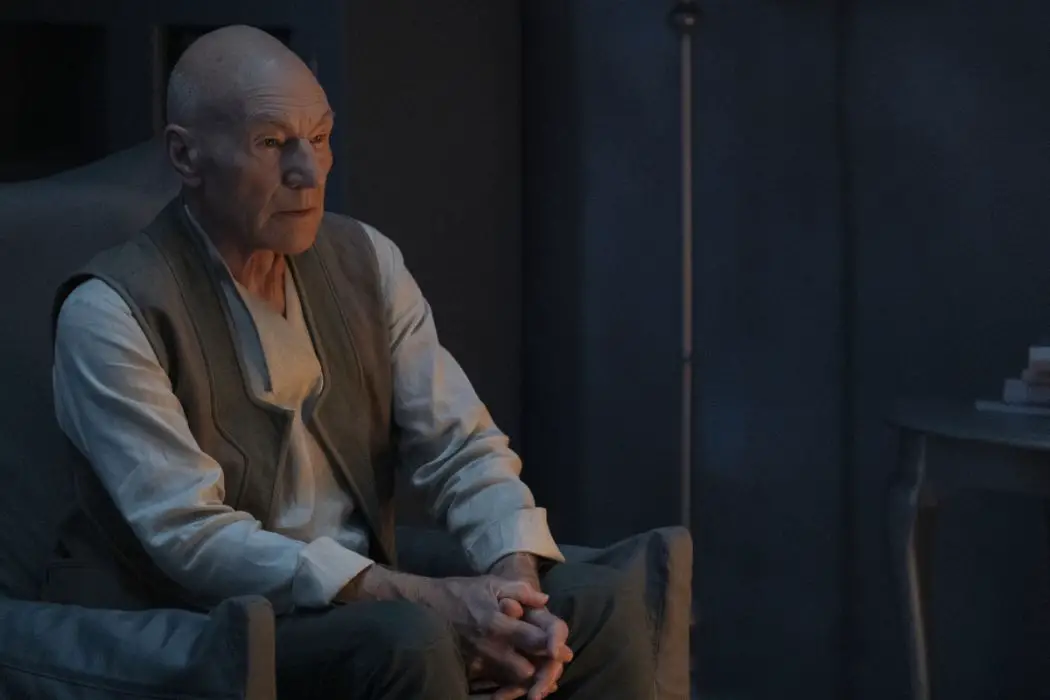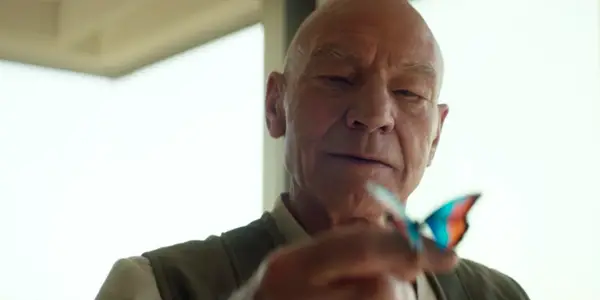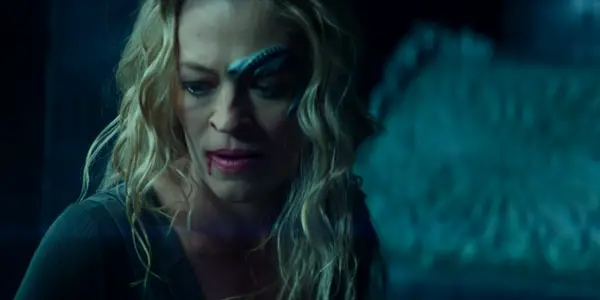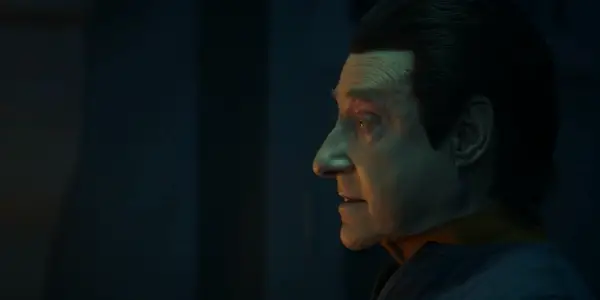STAR TREK: PICARD (S1E10) “Et In Arcadia Ego, Part 2”: A Stumble To The Finish Line

At some point, we were sold on a version of Star Trek: Picard that dug deep into the legacy of this once-great Captain, explored what kept him grounded for so many years, and reignited a sense of hope in a franchise that’s struggled of late to live up to its own ideals. Somewhere along the way, that version got swept away in a sea of bloated, disjointed storytelling and a season-long plot that couldn’t make heads or tails of its own grab bag of familiar Trek elements.
There was enjoyment to be had—early episodes showed flashes of the man Picard had become and teased a larger narrative that built on Trek history, while “Nepenthe” offered a heartwarming reminder of the power these characters still hold—though it all came together as a haphazard, Frankenstein’s monster of a season. One that only seemed to remember as it came to a close that it was supposed to resemble an intimate character piece.

“Part 2” does its due diligence, offering enormous spectacle and fan service by the bucketload (Captain Riker? Check! Picard Maneuver? Check!). But ultimately, this is (or at least tries to be) the story of an old man and the android that haunts his dreams. That’s what this whole thing has been about, right? Well, that’s what the first and last episodes were about anyway, everything in between was more to do with juggling the Borg, the Romulans, and various other ghosts from Picard’s past.
Showdown at Coppelius
All these elements crash into each other this week—the Zhat Vash forces, led by Commodore Oh, arrive at the Synth homeworld and unleash a barrage of phaser fire on the orchids, while Picard tries to stall long enough for Soji to change her mind. The conflict here largely rings false though, since it took seven episodes to really get in Soji’s head and only two to show her betray Picard and then come back around. On paper, it tracks that she might join Sutra to aid her fellow androids and perhaps that Picard’s speech would appeal to the humanity she’d gained throughout the season. But to say the show has actually done the narrative legwork to get there would be generous, at best. These things happen because the plot requires it, but there’s little to actually ground it all in discernible human (or android) drama.
Picard and Soji simply have not been given time to develop a relationship that would make this land, no matter how much Stewart acts his heart out. Unfortunately, the same can also be said about all of Picard‘s makeshift crew, made all the more apparent as he dies in their arms. Who is Jean-Luc Picard to Raffi, Jurati, Rios, and Elnor? We’re told in dialogue that he means a considerable amount to them, and vice-versa, but as they wipe away their tears it’s all too apparent that this bunch hasn’t formed the kind of bond the show thinks they have. We spent half the season getting these people together and even less of that watching them form or rekindle any real connection, and as such, this plays like capable actors trying to salvage material that just isn’t working.

Elsewhere, Seven of Nine tangles with Narissa—who despite seemingly beaming off Artifact and onto a ship in “Broken Pieces”, is actually still on the cube. She gets kicked down a shaft for her troubles, but all this serves only as a reminder of what a godawful villain she’s been. That she could be disposed of so quickly without impacting anything else shows what an afterthought this character was in the grand scheme. Seven later expresses regret over killing again (after the events of “Stardust City Rag”), but this doesn’t coalesce into anything resembling a meaningful arc.
It’s a shame a character who was once on a journey to both understand humanity and discover herself in the process is now grappling with whether it’s right to kill in the name of vigilante justice. This material is pretty blunt, lacking in nuance and could be given to any character really, making it all the more disappointing that it was handed to one of Trek‘s most fascinating characters. The ending shows some promise, with a relationship with Raffi set up for season two, so perhaps there’s hope yet.
Looking to the End
Speaking of the ending, there’s also the matter of the rather large elephant in the room—that Picard, having sacrificed himself to save the day, is now an android. First off, it was my understanding that his death was caused by the unnamed syndrome affecting his brain, so all his talk of “sacrifice” was puzzling and not properly communicated in the episode. Secondly, now that Picard’s an android, what else is there to do with him? The show initially presented itself as his last journey into the unknown, but now he’s been given a get-out-of-death-free card and a cure for the unnamed syndrome, so what now? What’s the emotional core of the show now its titular character has no real purpose beyond flying around in the ship, doing… something. “Mortality gives meaning to human life”, Data tells his old Captain in a bizarre robo-limbo, a sentiment that’d land a whole lot better had they not just put his consciousness in a new android body.
And speaking of the Data scene, it feels like a cloying, haphazard way to bring the show back to where it began. The idea that Data (or some version of him) is still alive comes entirely out of nowhere, while the rushed attempt to give him a fitting send-off might work if this element was introduced more than five minutes prior. The character already died back in Nemesis and the revelation of his continued existence, followed by his wish to be able to die, is straining for a level of poignancy that episode just can’t give it.

But hey, at least the show actually brought this thread back, unlike the situation with the Romulan refugees—who are apparently just stuck on their planet, despite the Romulans’ ability to amass a large fleet—or the fact that Jurati killed Maddox, but remains on the crew. Even the idea that the Federation had lost its way got swept under the rug, with the big ‘Starfleet to the rescue’ moment being a wholly triumphant one, despite no effort being made to show us how their position has changed. Sure, the synth ban is lifted, but that happens entirely off-screen, with none of our characters being involved in the decision. It’s all just paying lip service to ideas without any kind of long-term follow-up.
And that about sums up the season, really—some interesting ideas, and great performances, but nowhere for them to go. The episodes, bar one or two, just weren’t strong enough as standalone entries and the larger story was a puzzling, unwieldy mess that failed to say anything about the man at the center. Whether or not “Part 2” was the worst entry in Picard‘s first season is up for debate, but what it did was to highlight all that’s made it a well-produced but frustrating show that, sadly, fell shy of the mark. Until next season!
Further Thoughts
- The magical device that can fix ships and produce images out of thin air is oh so emblematic of the shows lazy, thoughtless writing.
- What was the point of Oh and Narissa infiltrating Starfleet, again? Throw that on the pile of forgotten plot threads, I guess.
- Boy, it’s going to be awkward when robo-Picard meets the rest of the old crew next season, huh.
Does content like this matter to you?
Become a Member and support film journalism. Unlock access to all of Film Inquiry`s great articles. Join a community of like-minded readers who are passionate about cinema - get access to our private members Network, give back to independent filmmakers, and more.













